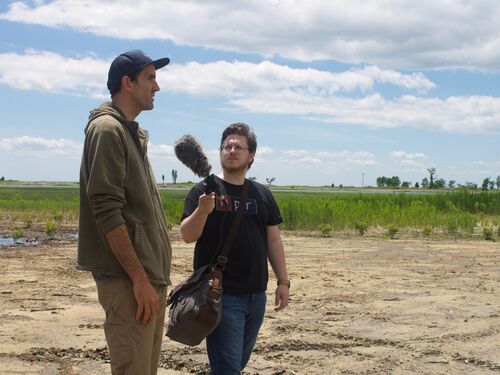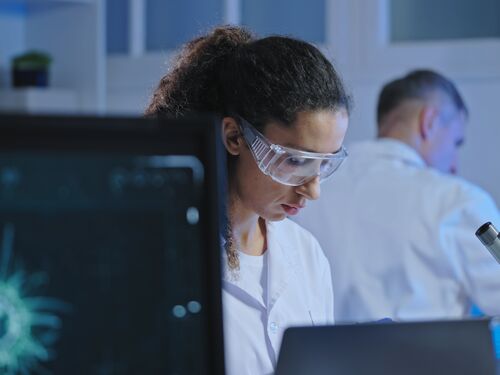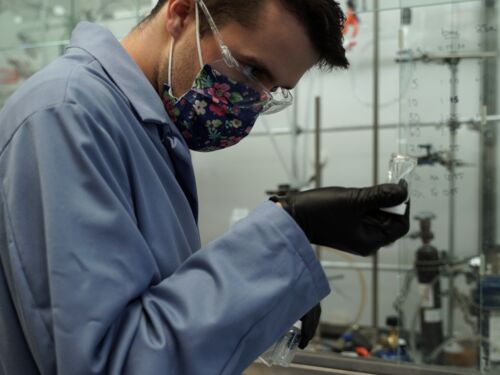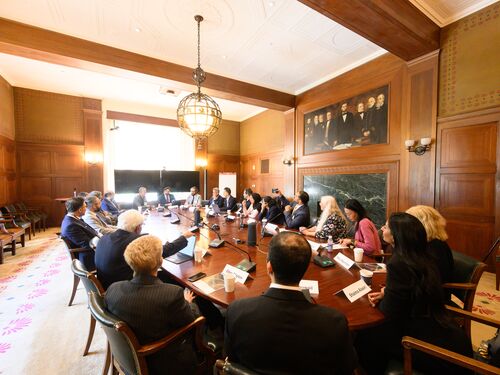International Science Academies Meet in Poland to Explore How to Support Ukrainian Science and Researchers
Feature Story
By Molly Galvin
Last update June 3, 2022
As the war in Ukraine rages on with no end in sight, concern is growing among the international science community about immediate and lasting damage to the Ukrainian science enterprise and global research. Yesterday, the U.S. National Academy of Sciences (NAS) and the Polish Academy of Sciences brought together leaders from the National Academy of Sciences Ukraine (NASU) and several other national science academies for a meeting in Warsaw to identify concrete actions the international science community can take to support Ukrainian researchers and science capabilities.
“This meeting today is crucial for Ukrainian science,” said Anatoly Zagorodny, the president of the NASU, who joined the gathering as part of his first trip out of the country since the war began. Much critical science infrastructure in Ukraine has been damaged or destroyed, he noted, including the Kharkiv Institute of Physics and Technology and several universities. Many researchers have joined the Ukrainian military to defend the country, and while science institutes inside the country are still functioning, researchers who remain have lost financial support due to wartime cuts in funding. In addition, thousands of scholars have been forced to flee — most of whom are women, including some 220 researchers who have been temporarily placed in Polish research institutions — and they also need financial support and opportunities to continue their research.
“The situation is complicated but the [Ukrainian] institutes still work,” said Zagorodny. “We’re doing our best to continue research to help our country.”
“We need Ukrainian scientists to help support efforts worldwide — to deal with problems like climate change, pandemics, and energy for the future,” said NAS President Marcia McNutt. “But more urgently, Ukraine will need good scientists in order to rebuild the country once this oppression ceases.”
McNutt, Zagorodny, and Polish Academy of Sciences President Jerzy Duszyński were joined by the presidents of Germany’s Leopoldina science academy, the Royal Danish Academy of Sciences and Letters, the ALLEA European Federation of Academies of Sciences and Humanities, and leaders from the Royal Society of the United Kingdom. The group is developing a 10-point plan to meet immediate and long-term needs to support Ukrainian science. They identified steps such as providing funding for young researchers still in Ukraine, donating vital research equipment to Ukrainian research institutions, continuing to temporarily place and support Ukrainian researchers in Poland and other countries until they can return home, and providing international networking opportunities to Ukrainian scholars.
Along those lines, soon after the war began, the NAS entered into a partnership with the Polish Academy of Sciences to help temporarily appoint fleeing Ukrainian researchers to Polish research institutions. Administered through the U.S. academy’s Scientists and Engineers in Exile or Displaced (SEED) program, the effort aims to prevent permanent “brain drain” by keeping these researchers engaged in their work and connected to the global research community until they can return to Ukraine. The science academy leaders also met with approximately 70 of those scientists to hear their concerns and suggestions.
Once the war is over, global science academies should also advocate in their home countries to ensure that restoring Ukrainian science is a priority along with rebuilding other critical Ukrainian infrastructure, said U.S. NAS President McNutt. “We want to ensure that Ukrainian science emerges stronger and more vital — not just for Ukraine but for the entire world.”
More like this
Discover
Events
Right Now & Next Up
Stay in the loop with can’t-miss sessions, live events, and activities happening over the next two days.
NAS Building Guided Tours Available!
Participate in a one-hour guided tour of the historic National Academy of Sciences building, highlighting its distinctive architecture, renowned artwork, and the intersection of art, science, and culture.



